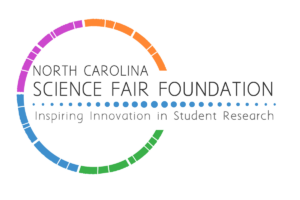The NCSEF follows all International Science & Engineering Fair (ISEF) rules and uses the ISEF forms.
General Rules
The NCSEF follows all International Science & Engineering Fair (ISEF) rules and uses NCSEF and ISEF forms. Please refer to the Forms page for detailed information concerning each Form.
Any exhibit or student that does not follow the stated NCSEF and ISEF Rules and Forms will be disqualified and the exhibit will not be judged.
If you need the ISEF Rules and Forms in Spanish they are available. However, the forms and all Fair-related documents must be submitted in English to be eligible for competition.
To be eligible to compete in the regional and state fairs, each student participant must meet each of these requirements:
- Each student participant must be registered (both for individual and team projects). All forms must be submitted by the deadline to ensure that there is sufficient time for them to be reviewed by the SRC. Deadlines for registration for the NCSEF vary according to the date of your regional fair – please contact your regional fair director if you are unsure of your specific deadline date.
- Projects must be registered in the correct division. Students must be enrolled in one of the grade levels below. Teams must consist of students in the same division.
- Elementary Division: grades 3-5
- Junior Division: grades 6-8
- Senior Division: grades 9-12
- Projects must be correctly categorized See the category descriptions for details
- Junior and Senior division use the ISEF categories: Biological Science A, Biological Science B, Chemistry, Earth/Environmental Science, Engineering, Mathematics, Physics, or Technology.
- Elementary division use Biological Sciences, Chemistry, Earth/Environmental Sciences, Engineering/Technology, or Physics/Mathematics.
- The NCSEF safety review committee (SRC) may recommend student(s) move their entry to an another more appropriate category based on its content. The final decision to change categories will be left to the student.
- No category changes are permitted on the day of the fair.
- Students should arrive early, at least 45 minutes before the start of closed judging, to check in, pick up their exhibit space number and registration materials, set up their displays and be approved by the Display and Safety Committee. To make this process smother for everyone, especially those traveling several hours to Raleigh, some students may be invited to check in and set up their displays the evening before the fair.
- Projects must be reviewed for safety. After setting up your display, please remain with your project for final review to compete by the Display and Safety Committee. Students who leave their projects before they are approved for display will be disqualified. This is a busy time so a15- to 20-minute wait might be necessary so please allow enough time in your schedule.
- Displays are not eligible for competition. The NCSEF exists to promote student research.
- A maximum of three students may work together as a team on any project. Individual and group projects will be judged together.
- Project display boards should provide sufficient detail to understand the project’s purpose, process and outcome
- Project displays must fit within ISEF limits.
- The best projects are clearly described in their display board and require no additional information to be understood by judges. Visual aids may be added to enhance the presentation but should not be required for the presentation to be understood. Note that this is less true in Technology and Engineering categories,
- All text should be legible and written in English (typed or clearly handwritten) unless the use of phrases in other languages was an integral part of the study.
- Display boards are judged for the quality and interpretability of the data; not aesthetic appearance. Going to great financial expense to generate the display is not necessary and will not increase your chances of placing in the competition. Elementary projects neatly presenting solid research in crayon have received awards while projects professionally typeset and covered in flashing lights and glitter next to it has not.
- Some items may be prohibited for display
- The Display and Safety Committee (SRC) and/or officials for the NCSEF and all regional fairs have the right to refuse permission for specific items to remain in an exhibit for reasons of safety, sanitation, or the best interests of the Fair.
- These decisions are final and are made to help ensure fair and safe competition at that fair. Items previously allowed at a local or even regional fair may be refused.
- Replacement of prohibited items is grounds for disqualification of the project and student(s) presenting it
- Refer to the ISEF Display and Safety Regulations for more information about what is and is now allowed. When in doubt, contact the SRC before the fair to allow sufficient time to make other arrangements such as photographing, drawing, etc. any items that will not be permitted.
- The NCSEF Abstract form must be displayed with all projects
- An abstract a very brief explanation of what you did and what results you got, without a lot of details. Here is an example:“In this experiment, we wanted to find out if brushing a horse would calm it down. To measure this, we first measured the horse’s initial heart rate. Then, for various intervals of time, we brushed the animal, measuring its heart rate every two minutes. We discovered that the heart rate went down over the first few minutes of brushing, but then remained steady. From this data, we discovered that the brushing did calm the horse as expected, but that there was a lower limit of heart rate that prolonged brushing did not change”
- Download the editable PDF form available here and submit the completed PDF form with your registration, Teams should ensure at least one of the team members has submitted an abstract for their project. Scans or photographs are acceptable if the student is unable to complete the editable PDF, but are often illegible and not recommended
- Each abstract receives an initial review by the Safety Review Committee (SRC) at registration time. An embossed, gold-colored sticker and will be affixed to the abstract at the project set-up location by the SRC at final review the morning of the fair.
- The NCSEF Abstract must be prominently displayed on the table or mounted on the board. Acrylic frames are permitted but unnecessary. Glass frames are prohibited.
- This is the only abstract allowed. This helps judges maximize their time talking with students about their research. Any use of the word “abstract” outside of this form will be covered by the SRC with tape/post-it/etc. which must remain in place the duration of judging but will not impact the project’s score. Consider using “summary” instead of “abstract” on your display board.
- Students are encouraged to display a research paper and any research journals or data notebooks with their project to provide more details for the judges.
- Collaborations with science or engineering professional or institutions may not be displayed. The student’s own school affiliation is permissible.
- This helps prevent bias for or against the project and ensure the student’s work is what is being judged
- Any collaborations present on the board when the student sets up their display, will be covered with paper or tape which must remain in place throughout the judging process.
- Written acknowledgments should also be left off of the display for competition.
- The decisions of the judges during competition are final.
- All students are expected to behave respectfully and professionally with judges, fair personnel and volunteers, other students, and all visitors to their project displays during the fair. Fair personnel have the right to disqualify any competitors who behave inappropriately (including rudeness/disrespectfulness, use of foul/obscene language, continued loudness or unruliness after being asked to remain quiet, or any other disruptive, intimidating, or aggressive behavior), especially during the interview period
Categories
Divisions
Elementary – Grades 3-5
Junior — Grades 6-8
Senior – Grades 9-12
Elementary Categories
The Elementary Division has individual and team projects of up to 3 team members. Each project competes in one of five categories: Biological Sciences, Chemistry, Earth and Environmental Sciences, Physics and Mathematics, and Engineering/Technology to facilitate judging.
All of the Elementary projects are considered as a group for awards. Awards for Elementary Projects are “Exemplary Project” plaque and Honorable Mention Medals.
Junior and Senior Categories
- Biological Science A
- Biological Science B
- Chemistry
- Earth/Environmental Science,
- Physics
- Mathematics, Statistics, and Data Science
- Technology
- Engineering.
From one to three students can work on a single project. Each Regional Fair can nominate two entries from each of the seven categories for the state level NC Science and Engineering Fair.
Category Descriptions
Great care should be taken in selecting the category for competition that best matches the project. The following descriptions should be of assistance in making the most appropriate decisions. See detailed descriptions of the ISEF categories on the ISEF web site.
Biological Science A
- Animal Sciences (ANIM)
- Plant Sciences (PLNT)
- Microbiology (MCRO)
- Behavioral and Social Sciences (BEHA)
Biological Science B
- Cellular and Molecular Biology (CELL)
- Biomedical and Health Sciences (BMED)
- Translational Medical Science (TMED)
Chemistry
Earth/Environmental Science
- Earth and Environmental Sciences (EAEV)
- Environmental Engineering (ENEV)
- Energy: Sustainable Materials and Design (EGSD)
Physics
Mathematics, Statistics, and Data Science
Engineering
Technology
Who can help with your project?
Depending on the details of your project, there are several adults who can and some who must help you with your science fair project. Make sure you check the rules relevant to your project to make sure that you get the required help you need.
Adult Sponsor
- Oversees project to make sure that student
- is informed of ISEF Rules and Guidelines
- is aware of risks associated with project
- is aware of forms required for project
- will provide proper supervision during experimentation
- if required, submits project to IRB or SRC (see below)
- A teacher usually serves as Adult Sponsor but can also be a parent
Qualified Scientist
- Required for some projects
- Doctoral/professional degree related to student research or
- Masters degree with SRC approval (see below)
- Completes Qualified Science Form 2
Designated Supervisor
- Animal Care Supervisor for vertebrate animal projects
- Supervises projects involving hazardous chemicals, activities or devices
- Supervises projects requiring a Qualified Scientist when the Qualified Scientist cannot directly supervise the student
IRB (Institutional Review Board)
- Reviews human subject studies
- Membership must include:
- an educator
- a school administrator
- someone knowledgeable about evaluating physical and/or psychological risk: MD, PA, RN, psychiatrist, psychologist, licensed social worker or licensed clinical professional counselor
SRC (Scientific Review Committee)
- Reviews some projects before experimentation
- Reviews all projects just prior to competition
- All school and regional fairs have an SRC. Please visit your region’s webpage or contact your school or regional director regarding to whom you should address questions.
- There is a State level SRC that reviews all projects prior to the State level fair. If you have any questions regarding rules please email.
- Membership must include:
- a biomedical scientist (Ph.D., M.D., D.V.M., D.D.S., D.O.)
- an educator
- one other member
Elementary Research
Elementary student projects follow the ISEF Rules and Regulations as well with a few additional restrictions. ELEMENTARY STUDENTS CANNOT CULTURE BACTERIA!.
Elementary students should use the new NCSEF EZ Elementary Registration Form which replaces the ISEF Forms 1, 1A, and 1B. If the project is a team project, then each team member should complete the Form. Students should still use the ISEF Rules Wizard to determine if other approval forms are needed. Teachers or Sponsors should review the project Research Plan and any other required Forms for any issues with rules or safety before signing the NCSEF EZ Elementary Registration Form.

